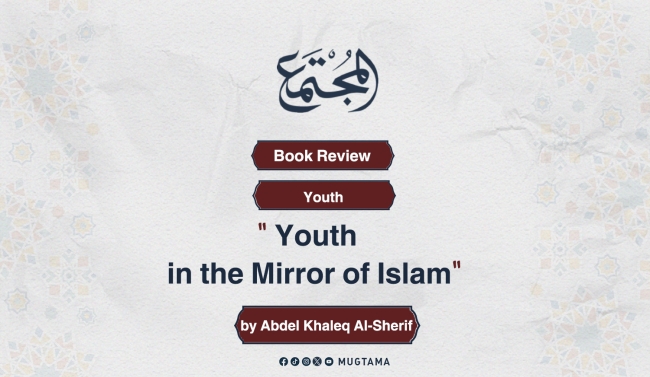Book Review: “Youth in the Mirror of Islam” by Abdel Khaleq Al-Sherif
The book “Youth in the Mirror of Islam” provides an extensive overview of one of the elements of a nation's strength and source of its pride and glory. If this element is lost or corrupted, nations and homelands collapse with it. If it grows and strengthens, societies and peoples rise with it.
The author of the book, Egyptian preacher Abdel Khaleq Al-Sherif, states that youth are the backbone of the Ummah and the fruitful tree that bears fruit. In the first chapter, he reviews some of what has been mentioned in the Quran and the Sunnah about youth.
The book, published in 2002, highlights youth models influenced by the Quran and Sunnah, most notably Zaid bin Thabit, Al-Arqam bin Abi Al-Arqam, Suhaib Al-Rumi, Umar bin Al-Khattab, Saad bin Abi Waqqas, Abu Ubaidah bin Al-Jarrah, Anas bin Malik, and other companions, may Allah be pleased with them all.
The second chapter of the book discusses what youth should be raised on, pointing to the Prophet Muhammad's method of education, the characteristics of the first generation, and the principles that Muslim youth should be raised on. These principles include faith in Allah, pride in Islam as a religion, and transforming the love for the Prophet Muhammad into a practical program.
These principles also encompass a comprehensive understanding of Islam, adherence to the path of this religion, remembrance, contemplation, seeking knowledge, balance in understanding Islam, avoiding the forbidden and doubtful matters, refraining from argument and negativity, and maintaining good health. Additionally, youth should embody noble morals, avoid being easily influenced, recognize their responsibility to convey this religion, and be concerned with the affairs of the Muslim Ummah.
The third chapter, which spans 333 pages, addresses some of the problems faced by youth, warning against Western methods of cultural and intellectual colonization instead of military colonization, which has proven unsuccessful. This is done through agents who promote its culture and values, advocate the separation of religion and state, and flood Muslim societies with Western culture, corrupting youth with desires, drugs, sex, and sports, and intimidating and restricting the religious in all aspects of life.
Al-Sherif details the dangers of bad company, idleness, sex, unemployment, and drugs as the main problems youth face at this stage, reminding them of Imam Shafi'i's saying: “If you do not occupy yourself with truth, you will occupy yourself with falsehood.”
The fourth chapter defines the value of positivity and provides evidence from the Quran and Sunnah, so that the meaning of Allah's words becomes a reality in the Muslim's soul: “Say, 'Indeed, my prayer, my rites of sacrifice, my living and my dying are for Allah, Lord of the worlds.'” (Al-An'am: 162), and the Prophet Muhammad's saying: “A group of people amongst my followers will remain obedient to Allah's orders and they will not be harmed by anyone who will not help them or who will oppose them, till Allah's Order (the Last Day) comes upon them while they are still on the right path.” (Agreed upon)
The author asks: How is positivity achieved in an individual? He answers: When one has some general foundations, such as feeling responsible, as an individual, for what Allah has commanded, not belittling or underestimating any work, looking at the results and great reward, not overburdening oneself, being highly motivated, creative, and confident in Allah's promise.
The book explains the effects of positivity on society as well as its negative aspects, emphasizing the importance of offering advice, the virtue of advice, the foundations upon which advice should be built, and the etiquette of giving advice. A wise Muslim does not wait for others to advise him but seeks advice from those he deems capable, and if it comes from someone unworthy, he should still accept it and benefit from any good it may have.
Al-Sherif urges readers of the book to strive for academic excellence, reminding them of the importance of knowledge in Islam, the ruling on acquiring knowledge, the goal of excellence, ways to achieve it, and the obstacles to it. He warns against boredom, forgetfulness, sins, bad company, arrogance, neglecting the remembrance of Allah, prayer, and reciting the Quran, and getting distracted by trivial matters.
The fifth chapter analyzes the nature of the reasons behind the problems faced by youth, including parents not fulfilling their duties, family disintegration, the weakness of scholars, the prevalence of corruption in society, the corrupt political climate, and indulgence in permissible amusements.
To address these issues, Al-Sherif suggests advice and guidance, encouragement and deterrence, enjoining good and forbidding evil, dialogue, choosing friends wisely, problem-solving, monitoring, evaluation, and correction. The necessary means to achieve the treatment plan include having practical role models at home, role models in educational institutions, enhancing the role of scholars and reformers in society, developing the roles of mosques, schools, clubs, and libraries educationally and socially, improving media content, encouraging political and civic participation, and promoting the love of the Arabic language. All these means aim to elevate youth intellectually, religiously, scientifically, morally, and politically, steering them away from the path of whims and Shaitan.
-------------------------------------------------------------


